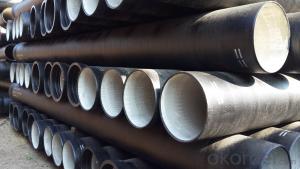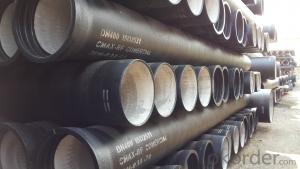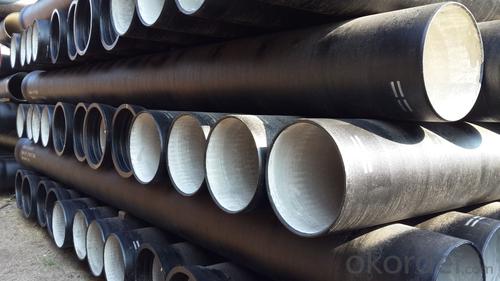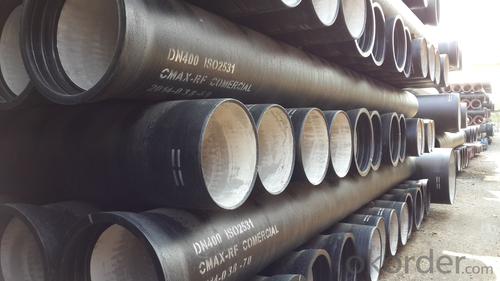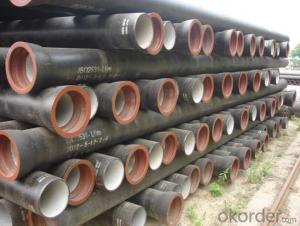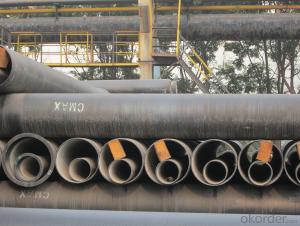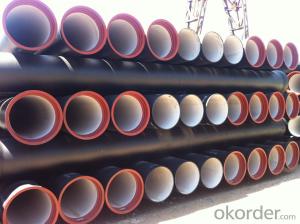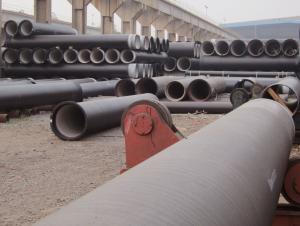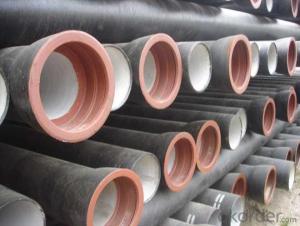Ductile Iron Pipe of China High Quality DN200-DN900 EN545/EN598/ISO2531
- Loading Port:
- China main port
- Payment Terms:
- TT or LC
- Min Order Qty:
- 24 m.t.
- Supply Capability:
- 80000 m.t./month
OKorder Service Pledge
OKorder Financial Service
You Might Also Like
1,Ductile Iron Pipe Description :
1) Pipes confirm to ISO2531,K9 class,T type joint,6m long,with inside cements lining conform to ISO4179, outside Zinc spraying(130g/m2) and bitumen coating(70μm) conform to ISO8179.
2) Pipe ends: Spigot and socket ends, with 100% SBR rubber gaskets accoding to ISO4633
3) we can do third party inspection according to customer's request.
4) Our products have been sold to many international market,such as Middle East and South East Asia and Africa.
2,Main Features of the Ductile Iron Pipe:
·High yield strength
·High tensile Strength
·High corrosion resistance
·Pressure Resistence
·Anti-corrosion
·Installation is convenient
·Satisfy the highest hygienic standards
.Material: Ductile iron grade 500-7/ 450-10 in accordance with ISO1083
3,Ductile Iron Pipe Images:
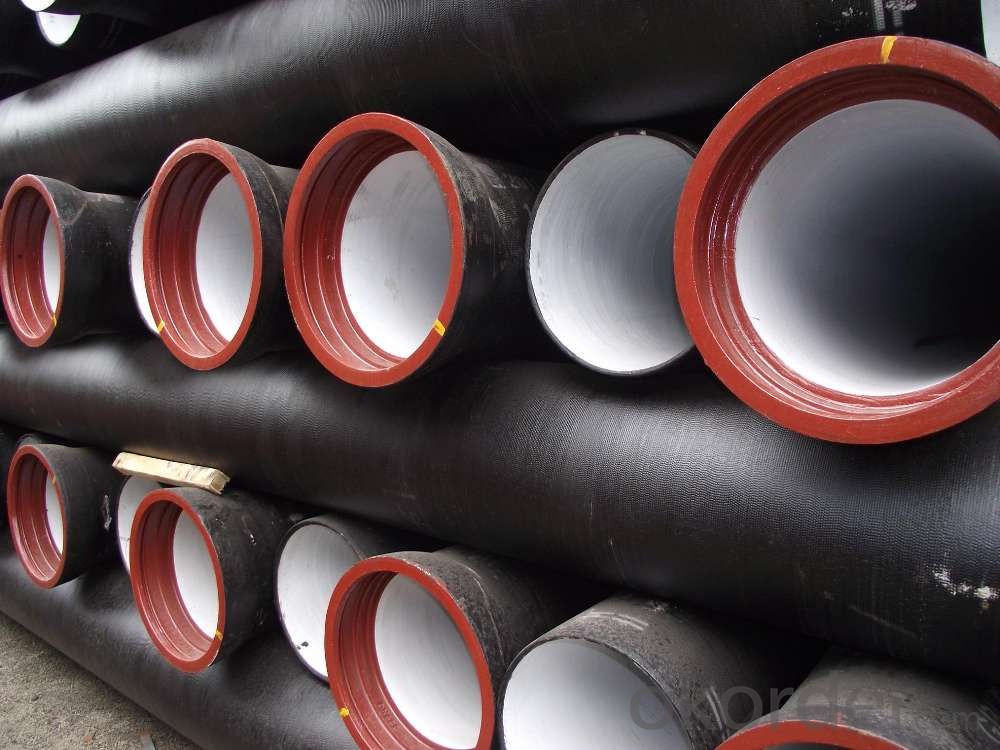
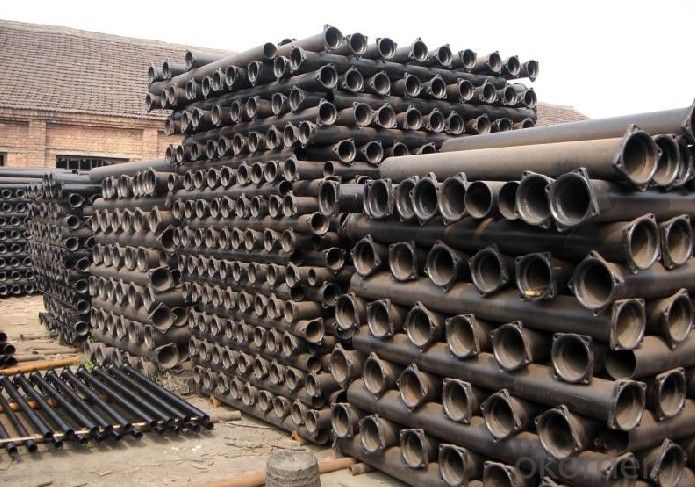
4. Ductile Iron Pipe Specification
Standard: API SPEC 5L 44th eidtion,ASTM A252-98(2007)
Grade: A53 Grades A/B, ASTM A106 Grades B/C,ASTM A179
AWWA, C200, ASTM A139, ASTM A120, API 5L Grade B
X42, X52, X56, X60, X65, X70, X80, X100
Weld Alternatives: LSAW
OD size range: 6.4~44.5mm
Wall thickness: 406.4~1422mm
Length: 3 - 12 m according to requirment
Note: Other grade can also be provided after consulting. Special design are available
for coal slurry conveyance LSAW line tube -- Service
5.FAQ:
We have organized several common questions for our clients,may help you sincerely:
1.Q: Why would you choose ductile iron pipe rather than other pipe materials?
A:The reasons are obvious for that not only ductile iron pipe possesses the inherent strength and flexibility of ductile iron, combined with proven corrosion protection systems, but also the cost savings can be achieved from design to installation and commissioning.
2.Q:Why can you guarantee the inner of pipes can’t be corroded?
A: High alumina cement mortar lining and sulphate-resistant cement mortar lining. These two special linings are applicable to inner anti-corrosion for sewage pipes, improving resistance to erosion of the sewage components.
- Q: What are the differences between ductile cast iron pipes and centrifugal ductile iron pipes?
- Small, thin pipe fittings are usually rolled or continuously cast, and large, thick pipes are usually centrifugally cast. Compared to sand casting, the tissue is compact and homogeneous.
- Q: Are ductile iron pipes prone to leakage?
- Ductile iron pipes are renowned for their leak resistance, owing to their durability and strength. Unlike PVC or cast iron pipes, this type of pipe is less susceptible to leaks. It is designed to endure high pressure and heavy loads, making it suitable for a range of applications such as water supply, sewage systems, and industrial pipelines. The leak resistance of ductile iron pipes can be attributed to their unique properties, including flexibility and shock absorption. With high tensile strength, these pipes can withstand internal and external pressure without cracking or breaking. Moreover, ductile iron pipes boast leak-proof joints. These joints are typically sealed with rubber gaskets and connected using methods like push-on joints or restrained joints with mechanical couplings. These joint designs ensure a secure and watertight connection, minimizing the risk of leaks. Nevertheless, under certain circumstances, ductile iron pipes can still experience leaks. Factors like age, corrosion, improper installation, or ground movement can contribute to leak development over time. Regular maintenance and inspections are crucial in detecting and resolving potential issues that may lead to leaks. In summary, while ductile iron pipes are generally resistant to leaks and renowned for their reliability, proper installation, regular maintenance, and timely repairs are vital to maximize their lifespan and prevent potential leaks.
- Q: Are ductile iron pipes suitable for installation in areas with high seismic activity?
- Ductile iron pipes are a suitable choice for installation in areas with high seismic activity. One of the key advantages of ductile iron pipes is their ability to withstand external loads and ground movement, making them ideal for seismic zones. Ductile iron pipes have excellent flexibility and high tensile strength, allowing them to withstand ground shifting and seismic forces without breaking or fracturing. Additionally, their high resistance to impact and stress make them less susceptible to damage during seismic events. Furthermore, ductile iron pipes have a proven track record of performance in seismic areas, as they have been successfully installed and used in earthquake-prone regions around the world for many years. They have demonstrated their ability to withstand the ground movements caused by seismic activity without compromising their structural integrity. Moreover, ductile iron pipes have the advantage of being highly durable and long-lasting, which is crucial in areas with high seismic activity where infrastructure needs to withstand frequent ground movements. Their longevity reduces the need for frequent maintenance and replacement, making them a cost-effective option in the long run. However, it is important to note that proper installation techniques and adherence to seismic design guidelines are essential to ensure the optimal performance of ductile iron pipes in high seismic areas. It is recommended to consult with experienced engineers and follow local building codes and regulations to ensure the pipes are installed correctly and can withstand the specific seismic conditions of the area. Overall, due to their flexibility, strength, durability, and proven performance, ductile iron pipes are considered suitable for installation in areas with high seismic activity.
- Q: Can ductile iron pipes be used for seawater intake systems?
- Seawater intake systems can utilize ductile iron pipes, which are a type of cast iron renowned for their strength, durability, and corrosion resistance. These properties render them suitable for various applications, including seawater intake systems. The high salt content of seawater makes it highly corrosive, posing a threat to regular cast iron pipes that may suffer from corrosion and damage over time. However, ductile iron pipes possess a protective coating acting as a corrosion barrier, enabling them to endure the harsh conditions of seawater. Furthermore, compared to regular cast iron pipes, ductile iron pipes exhibit superior tensile strength, enhancing their resistance to the intense pressures and stresses associated with seawater intake systems. As a result, ductile iron pipes offer a dependable and cost-effective option for seawater intake systems.
- Q: Does the cast iron pipe for spheroidal graphite need corrosion protection when laying underground?
- Ductile iron pipe is a kind of cast iron pipe.
- Q: What are the different methods for anchoring ductile iron pipe?
- There are several methods for anchoring ductile iron pipe, including thrust blocking, concrete encasement, pipe restraints, and thrust collars.
- Q: How are ductile iron pipes tested for quality assurance?
- To guarantee the quality and adherence to industry standards of ductile iron pipes, a variety of testing procedures are carried out. These tests evaluate both the raw materials and the finished products, aiming to ensure the pipes' durability, strength, and overall reliability. The first step involves analyzing the chemical composition of the raw materials used in the manufacturing process. This analysis verifies that the iron, carbon, and other elements fall within the specified range, as different compositions can impact the pipes' strength and resistance to corrosion. Next, mechanical tests assess the pipes' strength and ductility. Tensile tests determine properties like ultimate tensile strength, yield strength, and elongation, which help assess the pipes' ability to withstand external pressure and bending forces. Moreover, impact tests measure the pipe's ability to resist sudden loading or impact. By evaluating the energy absorbed by the pipes under high impact force, these tests ensure that the pipes can endure accidental impacts during installation or operation. Another pivotal test is the hydrostatic pressure test, which examines the pipes' capacity to withstand internal pressure. By subjecting the pipes to a specific pressure for a designated duration while filled with water, this test ensures their capability to handle expected operating pressures without any leakage or failure. Furthermore, dimensional and visual inspections are conducted to verify that the pipes meet the required specifications. These inspections involve checking the outer diameter, length, wall thickness, and overall appearance for any defects, such as cracks, voids, or irregularities. Lastly, corrosion resistance tests evaluate the pipes' ability to resist corrosion when exposed to different environments or fluids. These tests help determine the pipes' expected lifespan and their suitability for various applications. In conclusion, these quality assurance tests are vital in ensuring that ductile iron pipes adhere to the necessary standards and deliver dependable, long-lasting performance in diverse infrastructure projects.
- Q: Are ductile iron pipes suitable for wastewater treatment plants?
- Yes, ductile iron pipes are suitable for wastewater treatment plants. Ductile iron pipes are known for their durability, strength, and resistance to corrosion, making them ideal for handling the harsh and corrosive environment found in wastewater treatment plants. Additionally, they have a smooth internal surface, reducing the risk of clogging and facilitating the efficient flow of wastewater.
- Q: What is the expected hydraulic performance of ductile iron pipes?
- Ductile iron pipes are known for their exceptional hydraulic performance, boasting a remarkably smooth inner surface that facilitates fluid flow, resulting in reduced friction losses and increased flow rates. With excellent resistance to corrosion and abrasion, these pipes demonstrate long-lasting efficacy in diverse water and wastewater applications. In addition, the high tensile strength of ductile iron pipes enables them to withstand substantial internal and external loads without any deformation or failure. Their versatility allows for usage in both above-ground and below-ground scenarios, encompassing water distribution systems, sewage and wastewater transport, industrial piping, and irrigation systems. Moreover, the flexibility and resilience of ductile iron pipes enable them to adapt to ground movement and settle without any risk of breakage. This attribute proves invaluable in areas with unstable soil conditions or seismic activity, making these pipes a dependable choice. Overall, the hydraulic performance of ductile iron pipes is characterized by efficient flow, minimal pressure losses, durability, and the capacity to withstand various external forces. These exceptional qualities establish them as a favored option for water infrastructure projects, ensuring reliable and efficient fluid transportation over a prolonged service life.
- Q: Are there any limitations to the length of ductile iron pipe sections?
- Yes, there are limitations to the length of ductile iron pipe sections. The length of ductile iron pipe sections is typically limited due to practical considerations such as transportation, installation, and handling. Longer pipe sections can be more difficult to transport and maneuver, especially in areas with limited access or challenging terrain. Additionally, longer pipe sections may be more prone to damage during installation, as they can be more difficult to align and join properly. There are also limitations in terms of manufacturing capabilities. Ductile iron pipes are typically manufactured in standard lengths, which can vary depending on the manufacturer and the specific application. These standard lengths are typically designed to balance the needs of transportation, installation, and the overall performance of the pipe. Furthermore, longer pipe sections may pose challenges in terms of expansion and contraction due to temperature variations. Ductile iron pipes are susceptible to thermal expansion and contraction, and longer sections may experience greater stress and strain as a result. Therefore, while there is no absolute limit to the length of ductile iron pipe sections, practical considerations and manufacturing capabilities often result in the use of standard lengths that balance various factors such as transportation, installation, and performance.
Send your message to us
Ductile Iron Pipe of China High Quality DN200-DN900 EN545/EN598/ISO2531
- Loading Port:
- China main port
- Payment Terms:
- TT or LC
- Min Order Qty:
- 24 m.t.
- Supply Capability:
- 80000 m.t./month
OKorder Service Pledge
OKorder Financial Service
Similar products
Hot products
Hot Searches
Related keywords
